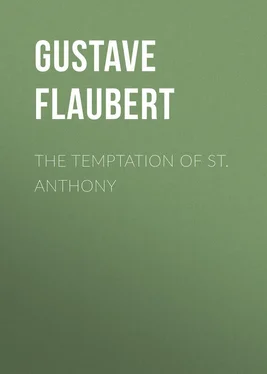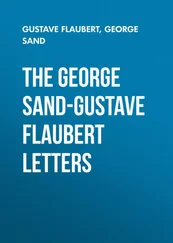Gustave Flaubert - The Temptation of St. Anthony
Здесь есть возможность читать онлайн «Gustave Flaubert - The Temptation of St. Anthony» — ознакомительный отрывок электронной книги совершенно бесплатно, а после прочтения отрывка купить полную версию. В некоторых случаях можно слушать аудио, скачать через торрент в формате fb2 и присутствует краткое содержание. Жанр: foreign_antique, foreign_prose, на английском языке. Описание произведения, (предисловие) а так же отзывы посетителей доступны на портале библиотеки ЛибКат.
- Название:The Temptation of St. Anthony
- Автор:
- Жанр:
- Год:неизвестен
- ISBN:нет данных
- Рейтинг книги:3 / 5. Голосов: 1
-
Избранное:Добавить в избранное
- Отзывы:
-
Ваша оценка:
- 60
- 1
- 2
- 3
- 4
- 5
The Temptation of St. Anthony: краткое содержание, описание и аннотация
Предлагаем к чтению аннотацию, описание, краткое содержание или предисловие (зависит от того, что написал сам автор книги «The Temptation of St. Anthony»). Если вы не нашли необходимую информацию о книге — напишите в комментариях, мы постараемся отыскать её.
The Temptation of St. Anthony — читать онлайн ознакомительный отрывок
Ниже представлен текст книги, разбитый по страницам. Система сохранения места последней прочитанной страницы, позволяет с удобством читать онлайн бесплатно книгу «The Temptation of St. Anthony», без необходимости каждый раз заново искать на чём Вы остановились. Поставьте закладку, и сможете в любой момент перейти на страницу, на которой закончили чтение.
Интервал:
Закладка:
He rises to his feet. The place is wholly empty. )
"What have I done!
"Had I died during those moments, I should have gone to hell – to irrevocable damnation."
( He trembles in every limb. )
"Am I, then, accursed? Ah! no; it is my own fault! I allow myself to be caught in every snare! No man could be more imbecile, more infamous! I should like to beat myself, or rather to tear myself out of my own body! I have restrained myself too long. I feel the want of vengeance – the necessity of striking, of killing! – as though I had a pack of wild beasts within me! Would that I could hew my way with an axe, through the midst of a multitude… Ah, a poniard!.."
( He perceives his knife, and rushes to seize it. The knife slips from his hand; and Anthony remains leaning against the wall of his hut, with wide-open mouth, motionless, cataleptic.
Everything about him has disappeared.
He thinks himself at Alexandria, upon the Paneum – an artificial mountain in the centre of the city, encircled by a winding stairway.
Before him lies Lake Mareolis; on his right hand is the sea, on his left the country; and immediately beneath him a vast confusion of flat roofs, traversed from north to south and from east to west by two streets which intercross, and which offer throughout their entire length the spectacle of files of porticoes with Corinthian columns. The houses overhanging this double colonnade have windows of stained glass. Some of them support exteriorly enormous wooden cages, into which the fresh air rushes from without.
Monuments of various architecture tower up in close proximity. Egyptian pylons dominate Greek temples. Obelisks appear like lances above battlements of red brick. In the middle of public squares there are figures of Hermes with pointed ears, and of Anubis with the head of a dog. Anthony can distinguish the mosaic pavements of the courtyards, and tapestries suspended from the beams of ceilings.
He beholds at one glance, the two ports (the Great Port and the Eunostus), both round as circuses, and separated by a mole connecting Alexandria with the craggy island upon which the Pharos-tower rises – quadrangular, five hundred cubits high, nine storied, having at its summit a smoking heap of black coals.
Small interior ports open into the larger ones. The mole terminates at each end in a bridge supported upon marble columns planted in the sea. Sailing vessels pass beneath it, while heavy lighters overladen with merchandise, thalamegii 6 6 Thalamegii – pleasure-boats having apartments.
inlaid with ivory, gondolas covered with awnings, triremes, biremes, and all sorts of vessels are moving to and fro, or lie moored at the wharves.
About the Great Port extends an unbroken array of royal construction: the palace of the Ptolomies, the Museum, the Posidium, the Cæsareum, the Timonium where Mark Anthony sought refuge, the Soma which contains the tomb of Alexander; while at the other extremity of the city, beyond the Eunostus, the great glass factories, perfume factories, and papyrus factories may be perceived in a suburban quarter.
Strolling peddlers, porters, ass-drivers run and jostle together. Here and there one observes some priest of Isis wearing a panther skin on his shoulders, a Roman soldier with his bronze helmet, and many negroes. At the thresholds of the shops women pause, artisans ply their trades; and the grinding noise of chariot wheels puts to flight the birds that devour the detritus of the butcher-shops and the morsels of fish left upon the ground.
The general outline of the streets seems like a black network flung upon the white uniformity of the houses. The markets stocked with herbs make green bouquets in the midst of it; the drying-yards of the dyers, blotches of color; the golden ornaments of the temple-pediments, luminous points – all comprised within the oval enclosure of the grey ramparts, under the vault of the blue heaven, beside the motionless sea.
But suddenly the movement of the crowd ceases; all turn their eyes toward the west, whence enormous whirlwinds of dust are seen approaching.
It is the coming of the monks of the Thebaid, all clad in goatskins, armed with cudgels, roaring a canticle of battle and of faith with the refrain :
"Where are they? Where are they?"
Anthony understands that they are coming to kill the Arians.
The streets are suddenly emptied – only flying feet are visible.
The Solitaries are now in the city. Their formidable cudgels, studded with nails, whirl in the air like suns of steel. The crash of things broken in the houses is heard. There are intervals of silence. Then great screams arise.
From one end of the street to the other there is a continual eddy of terrified people.
Many grasp pikes. Sometimes two bands meet, rush into one; and this mass of men slips upon the pavement – fighting, disjointing, knocking down. But the men with the long hair always reappear.
Threads of smoke begin to escape from the corners of edifices! folding doors burst open. Portions of walls crumble down. Architraves fall.
Anthony finds all his enemies again, one after the other. He even recognizes some whom he had altogether forgotten; before killing them he outrages them. He disembowels – he severs throats – he fells as in a slaughter house – he hales old men by the beard, crushes children, smites the wounded. And vengeance is taken upon luxury, those who do not know how to read tear up hooks; others smash and deface the statues, paintings, furniture, caskets, – a thousand dainty things the use of which they do not know, and which simply for that reason exasperates them. At intervals they pause, out of breath, in the work of destruction; then they recommence.
The inhabitants moan in the courtyards where they have sought refuge. The women raise their tearful eyes and lift their naked arms to heaven. In hope of moving the Solitaries they embrace their knees; the men cast them off and fling them down, and the blood gushes to the ceilings, falls back upon the walls like sheets of rain, streams from the trunks of decapitated corpses, fills the aqueducts, forms huge red pools upon the ground.
Anthony is up to his knees in it. He wades in it; he sucks up the blood-spray on his lips; he is thrilled with joy as he feels it upon his limbs, under his hair-tunic which is soaked through with it.
Night comes. The immense uproar dies away.
The Solitaries have disappeared.
Suddenly, upon the outer galleries corresponding to each of the nine stories of the Pharos, Anthony observes thick black lines forming, like lines of crows perching. He hurries thither; and soon finds himself at the summit.
A huge mirror of brass turned toward the open sea, reflects the forms of the vessels in the offing.
Anthony amuses himself by watching them; and while he watches, their number increases.
They are grouped together within a gulf which has the form of a crescent. Upon a promontory in the background, towers a new city of Roman architecture, with cupolas of stone, conical roofs, gleams of pink and blue marbles, and a profusion of brazen ornamentation applied to the volutes of the capitals, to the angles of the cornices, to the summits of the edifices. A cypress-wood overhangs the city. The line of the sea is greener, the air colder. The mountains lining the horizon are capped with snow.
Anthony is trying to find his way, when a man approaches him, and says :
"Come! they are waiting for you."
He traverses a forum, enters a great court, stoops beneath a low door; and he arrives before the facade of the palace, decorated with a group in wax, representing Constantine overcoming a dragon. There is a porphyry basin, from the centre of which rises a golden conch-shell full of nuts. His guide tells him that he may take some of them. He does so. Then he is lost, as it were, in a long succession of apartments.
Читать дальшеИнтервал:
Закладка:
Похожие книги на «The Temptation of St. Anthony»
Представляем Вашему вниманию похожие книги на «The Temptation of St. Anthony» списком для выбора. Мы отобрали схожую по названию и смыслу литературу в надежде предоставить читателям больше вариантов отыскать новые, интересные, ещё непрочитанные произведения.
Обсуждение, отзывы о книге «The Temptation of St. Anthony» и просто собственные мнения читателей. Оставьте ваши комментарии, напишите, что Вы думаете о произведении, его смысле или главных героях. Укажите что конкретно понравилось, а что нет, и почему Вы так считаете.












